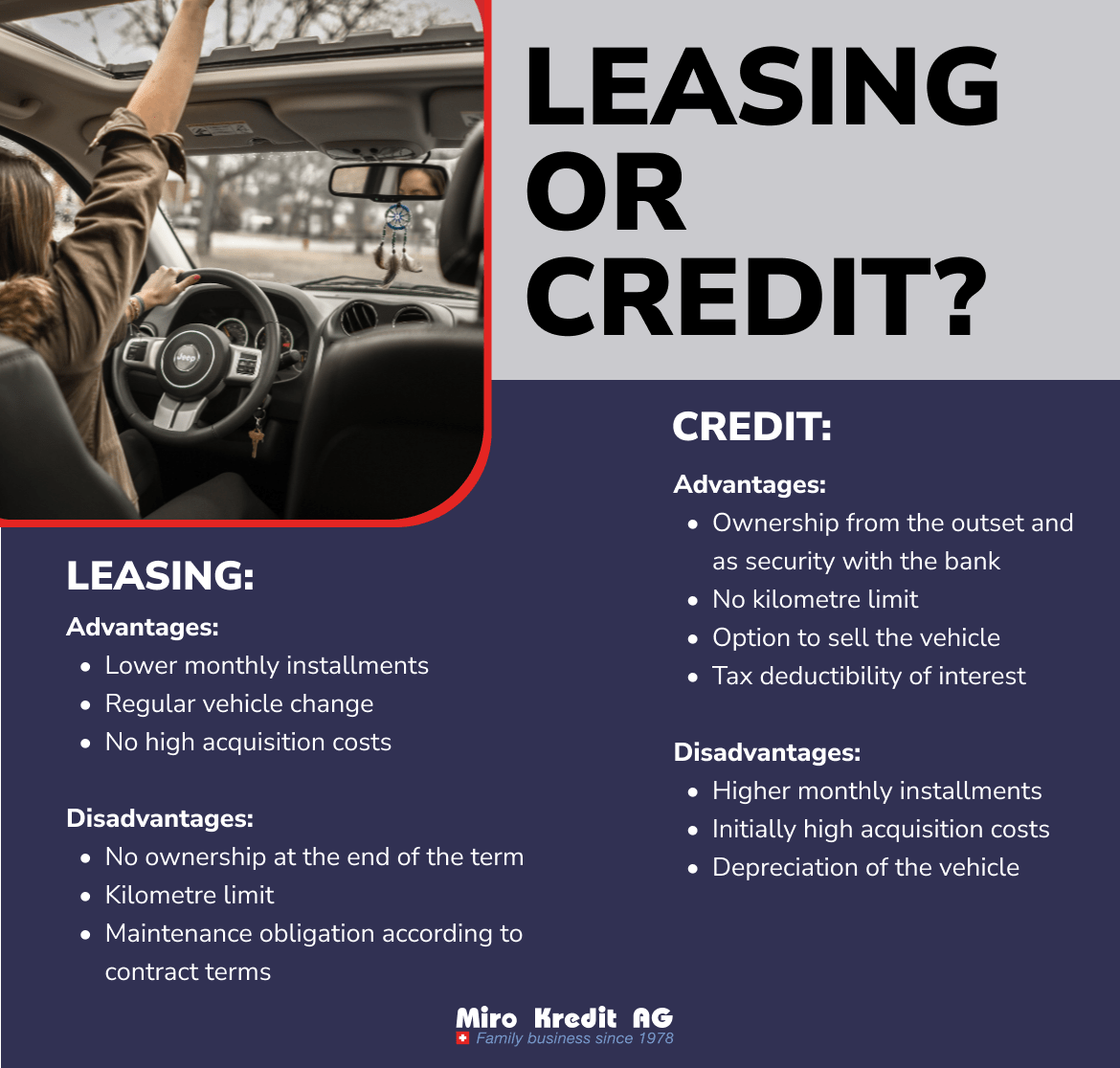Leasing or loan – which option is better for you?
For many private households, paying cash is often not an option, especially for larger purchases such as a new car. When choosing the right financing, the question often arises: leasing or credit?
Both methods offer certain advantages and disadvantages. The best choice therefore almost always depends on individual needs and financial circumstances. This article explains the differences between leasing and credit to help you decide which option is better for you.

Leasing or credit: definition
Before we delve deeper into the topic, we should first briefly explain the two terms.
What is leasing?
Leasing is basically a long-term form of renting and is often used for car financing. You pay monthly installments to use a vehicle or other asset without owning it. At the end of the leasing period, you usually have the option of buying the asset at a predetermined residual value or returning it and signing a new leasing contract.
What is a loan?
A loan is a contractual agreement in which a borrower receives a sum of money or something else of value. In return, the borrower undertakes to repay this amount to the lender in installments or in full at a later date. As a rule, borrowing is linked to the payment of interest. Typical types of loans are real estate loans or education loans in Switzerland.
Credit or leasing: advantages and disadvantages
In this section, we briefly discuss the respective advantages and disadvantages of both types of financing when purchasing a new car.
Advantages of leasing
- Lower monthly installments: As you only pay for the use of the vehicle and not for its full value, the monthly leasing installments are generally lower.
- Always the latest car: leasing allows you to drive a new model every few years.
- Lower maintenance costs: As the leasing period is often shorter than the service life of the vehicle, there are fewer maintenance and repair costs.
Disadvantages of leasing
- No ownership: At the end of the leasing contract, you do not automatically own the leased vehicle.
- Mileage restrictions: Many leasing contracts have a mileage limit, which incurs additional costs if exceeded.
- Contract fees: Early contract terminations or changes can be expensive.
Advantages of a loan
- Ownership: You are the legal owner of the car and can use and sell it as you wish.
- No mileage limit: Since you own the vehicle, there are no mileage limits.
- Value of the vehicle: After the loan has been repaid, the car still has a residual value that belongs to you.
Disadvantages of a loan
- Higher monthly installments: Since you are financing the entire vehicle, the monthly payments are usually higher.
- Depreciation: The value of the car decreases over time and you bear the entire risk of depreciation.
- Higher costs for maintenance and repairs: As the owner, you are responsible for all maintenance and repair costs.

A decision that depends on personal needs and plans
The decision between car leasing and car loans depends on various factors and personal needs. Incidentally, both financing options are registered with the Central Office for Credit Information (ZEK) – however, how long a ZEK entry remains in place depends on the type of information and the respective retention periods.
If you prefer lower monthly installments and don’t want to make a large down payment, leasing may be more suitable for you. The same applies if you attach great importance to driving a new model on a regular basis. On the other hand, if you want to save for the long term and own an asset, a loan is more advantageous.
Credit: often a better option for private individuals
As explained in the previous section, the choice of the right form of financing depends primarily on your circumstances and needs. A personal loan makes more sense, especially if you plan to keep the car for many years. Even if you have to drive many kilometers per year as a commuter, for example, taking out a loan is usually the better solution. Leasing contracts often have mileage restrictions and are therefore less interesting for this user group.
FAQ
In this section, we answer the most frequently asked questions on this topic.

Conclusion: a comparison of financing options is worthwhile
The first thing to note is that the decision between leasing and credit always depends on your individual needs and financial circumstances. Leasing offers lower monthly installments and flexible terms, but you do not own the vehicle at the end of the contract term.
A loan enables you to acquire property and offers more freedom in the use of the vehicle. However, the monthly installments are usually higher due to the interest on the loan. If you want to own a vehicle for the long term and can afford the interest on the loan over the term, buying on credit is the better option. Leasing is therefore particularly suitable for drivers who regularly have a new car and do not want to make a large investment.

Private loan calculation example
Loan amount: CHF 10,000 without insurance.
Repayment period: 12 months
Interest (including costs) amounts between CHF 240.45 and CHF 523.30. Effective interest rate 4.5% – 9.95%. Possible loan repayment period from 12 to 120 months
Processing fees: CHF 0.-. Granting a loan is prohibited if it leads to over-indebtedness (§ 3 Unfair Competition Law – UWG)